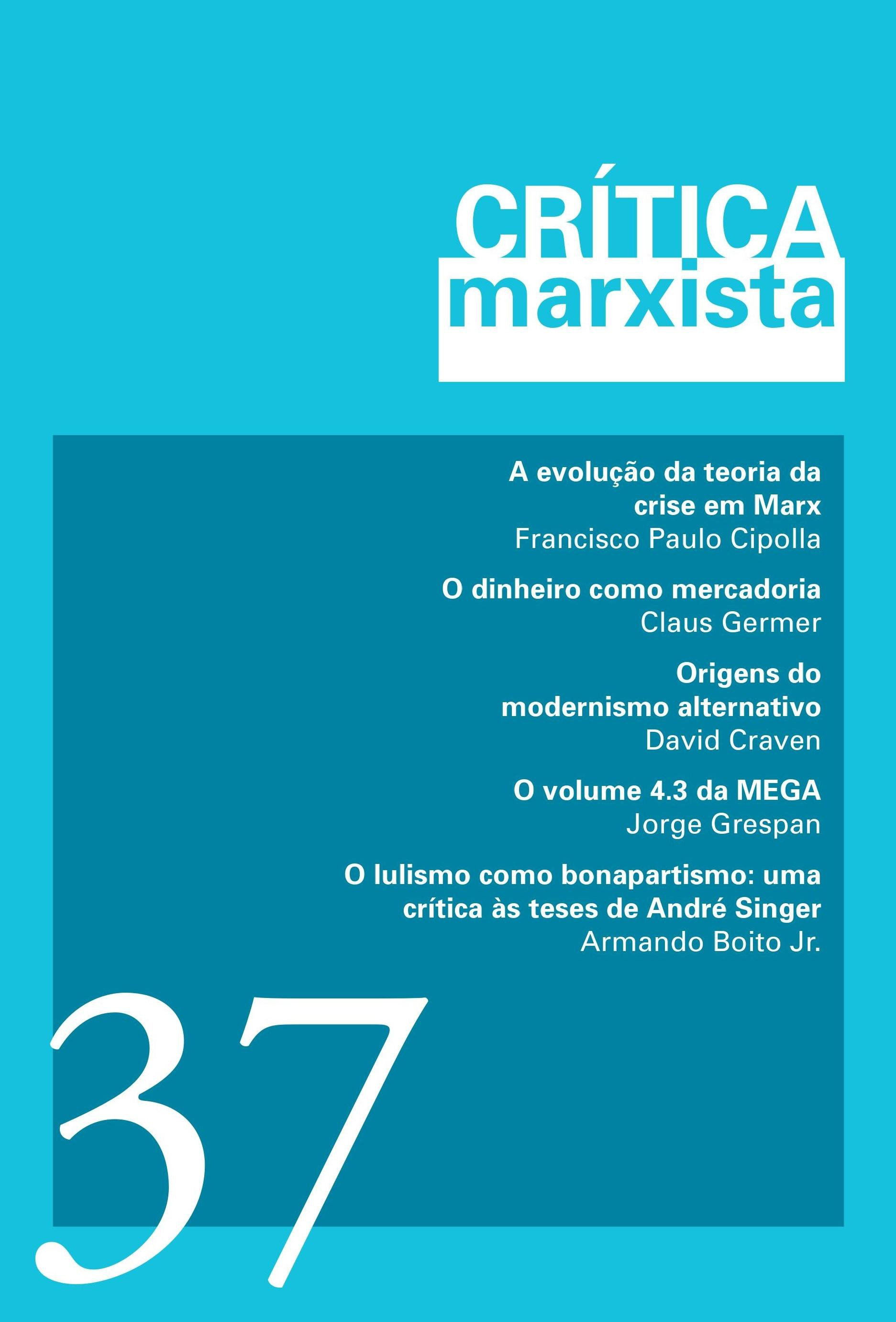Abstract
A diachronic reconstruction of the concept of “integral history” in Gramsci’s Prison Notebooks shows that two fundamental demands of the “philosophy of praxis” are articulated throughout this notion: 1) the need to re-define historical materialism (that is, a theory of history) from a particular perspective: the perspective of the popular masses in their political struggle for emancipation; 2) the need to counteract the revitalization of bourgeois hegemony proposed by Benedetto Croce through his “ethic-political history”, that Gramsci reads as a theory of “passive revolution”. If ethic-political history is based on the exclusion of conflict from history, integral history shows that this premise is not a theoretical element but a political need. In other words, the integral history reveals not only the “untruth” of Croce’s theoretical position, but at the same time its ability to produce a particular “truth”, that is to be an “hegemony”.
References
ALTHUSSER, L. A favor de Marx. Rio de Janeiro: Zahar Editores, 1979.
BASILE, L. Gramsci e la costellazione idealistica tra il 1914 ed il 1917. In: BELLO, A. D. (ed.). Marx e Gramsci: filologia, filosofia e politica allo specchio. Napoli: Liguori, 2011, p.117-128.
BURGIO, A. Gramsci storico: una lettura dei Cadernos del carcere. Roma-Bari: Laterza, 2002.
CILIBERTO, M. “Contraddizioni” dello storicismo. In: RICCHINI, C.; MANCA, E.; MELOGRANI, L. (a cura di). Gramsci: Le sue idee nel nostro tempo. Roma: Editrice l’Unità, 1987, p.82-84.
COSPITO, G. Egemonia. In: FROSINI, F.; LIGUORI, G. (ed.). Le parole di Gramsci: per un lessico dei “Quaderni del carcere”. Roma: Carocci, 2004, p.74-92.
CROCE, B. Etica e politica. Roma-Bari: Laterza, 1981.
DAL PRA, M. La dialettica in Marx: dagli scritti giovanili all’“Introduzione alla critica dell’economia politica”. 2.ed. Roma-Bari: Laterza, 1972.
D’ANDREA, U. La storia e la libertà. Critica fascista, a.10, n.9, 1932, p.166-169.
ENGELS, F. Ludwig Feuerbach und der Ausgangspunkt der klassischen deutschen Philosophie. In: MARX, K.; ENGELS, F. Werke. v.21. Berlin: Dietz, 1962.
ENGELS, F. Lettera a Franz Mehring, 14 luglio 1893. In: MARX, K.; ENGELS, F. Werke. v.39. Berlin: Dietz, 1968.
FRANCIONI, G. Gramsci tra Croce e Bucharin. Critica marxista, a.25, n.6, 1987, p.19-45.
FROSINI, F. Dialettica e immanenza da Labriola a Gramsci. In: BURGIO, A. (ed.). Dialettica: tradizioni, problemi, sviluppi. Macerata: Quodlibet, 2007, p.195-218.
FROSINI, F. Espaço e poder à luz da teoria da hegemonia. Comunicação apresentada no IV Seminário Científico Internacional de Teoria política do Socialismo: “Antonio Gramsci: as periferias e os subalternos”, 15-18 ago. 2011, Unesp, Marília.
GRAMSCI, A. Il Sillabo ed Hegel. Il Grido del Popolo, n.599, 15 gennaio 1916.
GRAMSCI, A. Quaderni del carcere. Edizione critica dell’Istituto Gramsci a cura di GERRATANA, V. Torino: Einaudi, 1975.
GRAMSCI, A. Lettere dal carcere. A cura di SANTUCCI, A. A. Palermo: Sellerio, 1996.
GRAMSCI, A. Epistolario. v.1, gennaio 1906–dicembre 1922. A cura di BIDUSSA, D.; GIASI, F.; VOGHERA, G. L.; RIGHI, M. L. Roma: Istituto della Enciclopedia Italiana, 2009.
HEGEL, G. W. F. (1986). Grundlinien der Philosophie des Rechts oder Naturrecht und Staatswissenschaft im Grundrisse. In: Werke. A cura di MOLDENHAUER, E.; MICHEL, K. M. v.7. Frankfurt am Main: Suhrkamp. Tradução para o português de VITORINO, O. Príncipios da filosofia do direito. São Paulo: Martins Fontes, 1997.
LABICA, G. Karl Marx: les “Thèses sur Feuerbach”. Paris: P.U.F, 1987.
LUKÁCS, G. Il giovane Marx. Tradução italiana de BOLAFFI, A. Roma: Editori Riuniti, 1978. (Do original: “Zur philosophischen Entwicklung des jungen Marx. 1840-1844”. Deutsche Zeitschrift fü r Philosophie, a.2, n.2, 1954, p.288-343).
MACHEREY, P. Marx 1845: Les “thèses” sur Feuerbach. Paris: Éditions Amsterdam, 2008.
MARX, K. Thesen über Feuerbach. In: MARX, K.; ENGELS, F. Werke. v.2. Berlin: Dietz, 1969a.
MARX, K. Zur Kritik der politischen Ökonomie. In: MARX, K.; ENGELS, F. Werke. v.13. Berlin: Dietz, 1969b.
MARX, K. Das Elend der Philosophie. Antwort auf Proudhons “Philosophie des Elends”. Tradução alemã de BERNSTEIN, E.; KAUSTKY, K. In MARX, K.; ENGELS, F. Werke. v.4. Berlin: Dietz, 1972.
MARX, K.; ENGELS, F. Die heilige Familie oder Kritik der kritischen Kritik. Gegen Bruno Bauer und Konsorten. In MARX, K.; ENGELS, F. Werke. v.2. Berlin: Dietz, 1957.
PAGGI, L. Antonio Gramsci e il moderno principe. v.1. Nella crisi del socialismo italiano. Roma: Editori Riuniti, 1970.
RAPONE, L. Cinque anni che paiono secoli: Antonio Gramsci dal socialismo al comunismo (1914-1919). Roma: Carocci, 2011.
SICHIROLLO, L. Dialettica. 2.ed. Milano: Mondadori, 1983.
THOMAS, P. D. The Gramscian Moment: Philosophy, Hegemony, and Marxism. Leiden: Brill, 2009.
WEIL, E. Hegel: quaderni di differenze. Urbino: Argalìa, 1962.

This work is licensed under a Creative Commons Attribution 4.0 International License.
Copyright (c) 2013 Fabio Frosini
